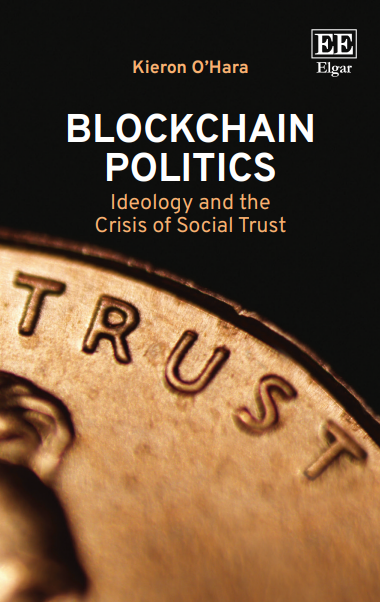Blockchain Politics
Posted on 05/02/25 in Politics, Trust

I’m very excited to see my forthcoming new book, Blockchain Politics: Ideology and the Crisis of Social Trust, appearing on the website of the publishers, Edward Elgar.
It sets out a three-stage argument, trying to diagnose our problems with political populism from first principles. The first stage sets out the theory of trust that I developed some years ago in a bit more detail, with emphasis on the social and the political contexts. Incidentally, in the next year or two I’ll be applying this trust theory to the governance of Artificial Intelligence with my long-time colleague Dame Wendy Hall, extending our work on Internet governance which we published with Oxford University Press as Four Internets.
The second stage looks at the philosophy of conservatism, again using my own research and definitions from earlier work. In this stage, I show that conservatism of the Burkean variety has a strong affinity for social trust and trustworthiness, by valuing the institutions and practices which underpin them. This, as far as I know, is a new and, to me at least, exciting combination of themes.
The final stage goes back to the debates between populism and the far left liberalism which have dominated politics for the last few years. I take it for granted that far right populism is destructive of trust, and thrives when trust is low – my book is not targeted at this kind of populism, although I am very much opposed to it, and have written on the topic elsewhere. My point is rather that liberalism, critical theory and identity politics between them are equally destructive of trust, and connive with the populists, each enabling the other, to undermine it.
This all matters, because the key tasks of government – the defence of the West against our geopolitical enemies and rivals, addressing climate change, adapting to ageing populations, provision of increasingly complex and critical infrastructure etc. – can only be dealt with politically with measures that will extend beyond the four or five year electoral cycle. That requires mutual trust in and across the political class, which will take some forging. In the book I muse about how it might be forged, but there must be consensus about our political project.
Why Blockchain Politics? Well, technology is part of the story of how trust got undermined. In particular, blockchain – which is a brilliant invention, I can say with my comp sci hat on – has promoted the idea of trustless trust, that trust can be manufactured by mechanisms and technology. No it can’t. It’s a human requirement that places constraints upon what will work, as I argue in the first two stages of the book. Until we understand that, and until our political elites, the Farages and Rayners, the Trumps and AOCs, understand it, we will be condemned to the empty ping pong that masquerades as politics nowadays, and those key governmental tasks will remain undone.
 Kieron O'Hara
Kieron O'Hara